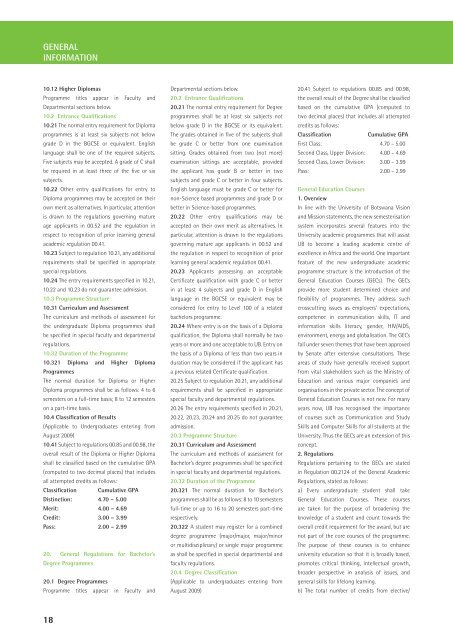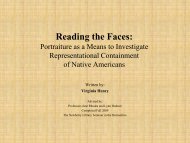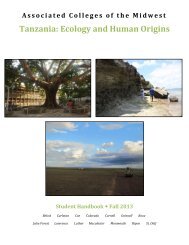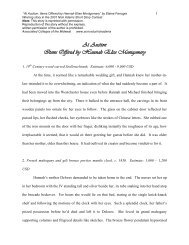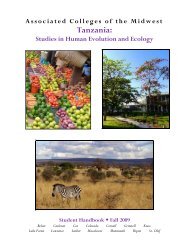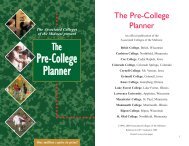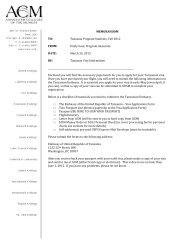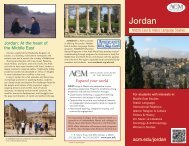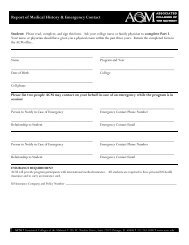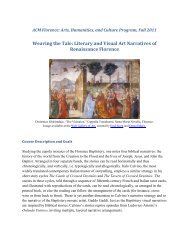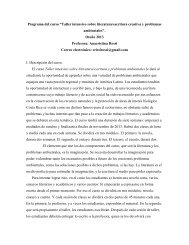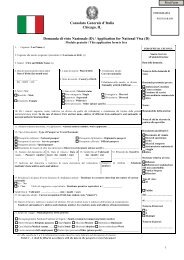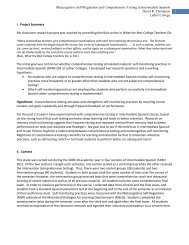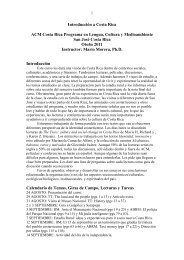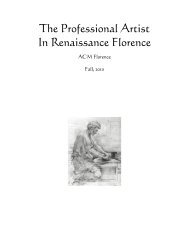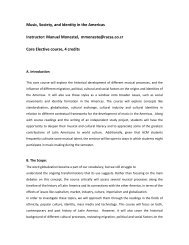academic calendar academic calendar - Associated Colleges of the ...
academic calendar academic calendar - Associated Colleges of the ...
academic calendar academic calendar - Associated Colleges of the ...
You also want an ePaper? Increase the reach of your titles
YUMPU automatically turns print PDFs into web optimized ePapers that Google loves.
GENERAL<br />
INFORMATION<br />
10.12 Higher Diplomas<br />
Programme titles appear in Faculty and<br />
Departmental sections below.<br />
10.2 Entrance Qualifications<br />
10.21 The normal entry requirement for Diploma<br />
programmes is at least six subjects not below<br />
grade D in <strong>the</strong> BGCSE or equivalent. English<br />
language shall be one <strong>of</strong> <strong>the</strong> required subjects.<br />
Five subjects may be accepted. A grade <strong>of</strong> C shall<br />
be required in at least three <strong>of</strong> <strong>the</strong> five or six<br />
subjects.<br />
10.22 O<strong>the</strong>r entry qualifications for entry to<br />
Diploma programmes may be accepted on <strong>the</strong>ir<br />
own merit as alternatives. In particular, attention<br />
is drawn to <strong>the</strong> regulations governing mature<br />
age applicants in 00.52 and <strong>the</strong> regulation in<br />
respect to recognition <strong>of</strong> prior learning general<br />
<strong>academic</strong> regulation 00.41.<br />
10.23 Subject to regulation 10.21, any additional<br />
requirements shall be specified in appropriate<br />
special regulations.<br />
10.24 The entry requirements specified in 10.21,<br />
10.22 and 10.23 do not guarantee admission.<br />
10.3 Programme Structure<br />
10.31 Curriculum and Assessment<br />
The curriculum and methods <strong>of</strong> assessment for<br />
<strong>the</strong> undergraduate Diploma programmes shall<br />
be specified in special faculty and departmental<br />
regulations.<br />
10.32 Duration <strong>of</strong> <strong>the</strong> Programme<br />
10.321 Diploma and Higher Diploma<br />
Programmes<br />
The normal duration for Diploma or Higher<br />
Diploma programmes shall be as follows: 4 to 6<br />
semesters on a full-time basis; 8 to 12 semesters<br />
on a part-time basis.<br />
10.4 Classification <strong>of</strong> Results<br />
(Applicable to Undergraduates entering from<br />
August 2009)<br />
10.41 Subject to regulations 00.85 and 00.98, <strong>the</strong><br />
overall result <strong>of</strong> <strong>the</strong> Diploma or Higher Diploma<br />
shall be classified based on <strong>the</strong> cumulative GPA<br />
(computed to two decimal places) that includes<br />
all attempted credits as follows:<br />
Classification Cumulative GPA<br />
Distinction: 4.70 – 5.00<br />
Merit: 4.00 – 4.69<br />
Credit: 3.00 – 3.99<br />
Pass: 2.00 – 2.99<br />
20. General Regulations for Bachelor’s<br />
Degree Programmes<br />
20.1 Degree Programmes<br />
Programme titles appear in Faculty and<br />
Departmental sections below.<br />
20.2 Entrance Qualifications<br />
20.21 The normal entry requirement for Degree<br />
programmes shall be at least six subjects not<br />
below grade D in <strong>the</strong> BGCSE or its equivalent.<br />
The grades obtained in five <strong>of</strong> <strong>the</strong> subjects shall<br />
be grade C or better from one examination<br />
sitting. Grades obtained from two (not more)<br />
examination sittings are acceptable, provided<br />
<strong>the</strong> applicant has grade B or better in two<br />
subjects and grade C or better in four subjects.<br />
English language must be grade C or better for<br />
non-Science based programmes and grade D or<br />
better in Science-based programmes.<br />
20.22 O<strong>the</strong>r entry qualifications may be<br />
accepted on <strong>the</strong>ir own merit as alternatives. In<br />
particular, attention is drawn to <strong>the</strong> regulations<br />
governing mature age applicants in 00.52 and<br />
<strong>the</strong> regulation in respect to recognition <strong>of</strong> prior<br />
learning general <strong>academic</strong> regulation 00.41.<br />
20.23 Applicants possessing an acceptable<br />
Certificate qualification with grade C or better<br />
in at least 4 subjects and grade D in English<br />
language in <strong>the</strong> BGCSE or equivalent may be<br />
considered for entry to Level 100 <strong>of</strong> a related<br />
bachelors programme.<br />
20.24 Where entry is on <strong>the</strong> basis <strong>of</strong> a Diploma<br />
qualification, <strong>the</strong> Diploma shall normally be two<br />
years or more and one acceptable to UB. Entry on<br />
<strong>the</strong> basis <strong>of</strong> a Diploma <strong>of</strong> less than two years in<br />
duration may be considered if <strong>the</strong> applicant has<br />
a previous related Certificate qualification.<br />
20.25 Subject to regulation 20.21, any additional<br />
requirements shall be specified in appropriate<br />
special faculty and departmental regulations.<br />
20.26 The entry requirements specified in 20.21,<br />
20.22, 20.23, 20.24 and 20.25 do not guarantee<br />
admission.<br />
20.3 Programme Structure<br />
20.31 Curriculum and Assessment<br />
The curriculum and methods <strong>of</strong> assessment for<br />
Bachelor’s degree programmes shall be specified<br />
in special faculty and departmental regulations.<br />
20.32 Duration <strong>of</strong> <strong>the</strong> Programme<br />
20.321 The normal duration for Bachelor’s<br />
programmes shall be as follows: 8 to 10 semesters<br />
full-time or up to 16 to 20 semesters part-time<br />
respectively.<br />
20.322 A student may register for a combined<br />
degree programme (major/major, major/minor<br />
or multidisciplinary) or single major programme<br />
as shall be specified in special departmental and<br />
faculty regulations.<br />
20.4 Degree Classification<br />
(Applicable to undergraduates entering from<br />
August 2009)<br />
20.41 Subject to regulations 00.85 and 00.98,<br />
<strong>the</strong> overall result <strong>of</strong> <strong>the</strong> Degree shall be classified<br />
based on <strong>the</strong> cumulative GPA (computed to<br />
two decimal places) that includes all attempted<br />
credits as follows:<br />
Classification<br />
Cumulative GPA<br />
First Class: 4.70 – 5.00<br />
Second Class, Upper Division: 4.00 – 4.69<br />
Second Class, Lower Division: 3.00 – 3.99<br />
Pass: 2.00 – 2.99<br />
General Education Courses<br />
1. Overview<br />
In line with <strong>the</strong> University <strong>of</strong> Botswana Vision<br />
and Mission statements, <strong>the</strong> new semesterisation<br />
system incorporates several features into <strong>the</strong><br />
University <strong>academic</strong> programmes that will assist<br />
UB to become a leading <strong>academic</strong> centre <strong>of</strong><br />
excellence in Africa and <strong>the</strong> world. One important<br />
feature <strong>of</strong> <strong>the</strong> new undergraduate <strong>academic</strong><br />
programme structure is <strong>the</strong> introduction <strong>of</strong> <strong>the</strong><br />
General Education Courses (GECs). The GECs<br />
provide more student determined choice and<br />
flexibility <strong>of</strong> programmes. They address such<br />
crosscutting issues as employers’ expectations,<br />
competence in communication skills, IT and<br />
information skills literacy, gender, HIV/AIDS,<br />
environment, energy and globalisation. The GECs<br />
fall under seven <strong>the</strong>mes that have been approved<br />
by Senate after extensive consultations. These<br />
areas <strong>of</strong> study have generally received support<br />
from vital stakeholders such as <strong>the</strong> Ministry <strong>of</strong><br />
Education and various major companies and<br />
organisations in <strong>the</strong> private sector. The concept <strong>of</strong><br />
General Education Courses is not new. For many<br />
years now, UB has recognised <strong>the</strong> importance<br />
<strong>of</strong> courses such as Communication and Study<br />
Skills and Computer Skills for all students at <strong>the</strong><br />
University. Thus <strong>the</strong> GECs are an extension <strong>of</strong> this<br />
concept.<br />
2. Regulations<br />
Regulations pertaining to <strong>the</strong> GECs are stated<br />
in Regulation 00.2124 <strong>of</strong> <strong>the</strong> General Academic<br />
Regulations, stated as follows:<br />
a) Every undergraduate student shall take<br />
General Education Courses. These courses<br />
are taken for <strong>the</strong> purpose <strong>of</strong> broadening <strong>the</strong><br />
knowledge <strong>of</strong> a student and count towards <strong>the</strong><br />
overall credit requirement for <strong>the</strong> award, but are<br />
not part <strong>of</strong> <strong>the</strong> core courses <strong>of</strong> <strong>the</strong> programme.<br />
The purpose <strong>of</strong> <strong>the</strong>se courses is to enhance<br />
university education so that it is broadly based,<br />
promotes critical thinking, intellectual growth,<br />
broader perspective in analysis <strong>of</strong> issues, and<br />
general skills for lifelong learning.<br />
b) The total number <strong>of</strong> credits from elective/<br />
18


